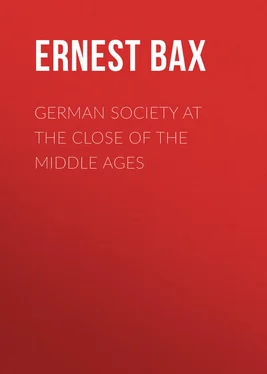Ernest Bax - German Society at the Close of the Middle Ages
Здесь есть возможность читать онлайн «Ernest Bax - German Society at the Close of the Middle Ages» — ознакомительный отрывок электронной книги совершенно бесплатно, а после прочтения отрывка купить полную версию. В некоторых случаях можно слушать аудио, скачать через торрент в формате fb2 и присутствует краткое содержание. Жанр: foreign_antique, foreign_prose, на английском языке. Описание произведения, (предисловие) а так же отзывы посетителей доступны на портале библиотеки ЛибКат.
- Название:German Society at the Close of the Middle Ages
- Автор:
- Жанр:
- Год:неизвестен
- ISBN:нет данных
- Рейтинг книги:5 / 5. Голосов: 1
-
Избранное:Добавить в избранное
- Отзывы:
-
Ваша оценка:
- 100
- 1
- 2
- 3
- 4
- 5
German Society at the Close of the Middle Ages: краткое содержание, описание и аннотация
Предлагаем к чтению аннотацию, описание, краткое содержание или предисловие (зависит от того, что написал сам автор книги «German Society at the Close of the Middle Ages»). Если вы не нашли необходимую информацию о книге — напишите в комментариях, мы постараемся отыскать её.
German Society at the Close of the Middle Ages — читать онлайн ознакомительный отрывок
Ниже представлен текст книги, разбитый по страницам. Система сохранения места последней прочитанной страницы, позволяет с удобством читать онлайн бесплатно книгу «German Society at the Close of the Middle Ages», без необходимости каждый раз заново искать на чём Вы остановились. Поставьте закладку, и сможете в любой момент перейти на страницу, на которой закончили чтение.
Интервал:
Закладка:
The guild was a characteristic of all mediæval life. On the model of the village-community, which was originally based on the notion of kinship, every interest, craft, and group of men formed itself into a "brotherhood" or "guild". The idea of individual autonomy, of individual action independent altogether of the community, is a modern idea which never entered the mediæval mind. As we have above remarked, even the mendicants and vagabonds could not conceive of adopting begging as a career except under the auspices of a beggars' guild. The guild was not like a modern commercial syndicate, an abstract body united only by the thread of one immediate personal interest, whose members did not even know each other. His guild-membership interpenetrated the whole life, religious, convivial, social and political, of the mediæval man. The guilds were more or less of the nature of masonic societies, whose concerns were by no means limited to the mere trade-function that appeared on the surface. "Business" had not as yet begun to absorb the whole life of men. The craft or "mystery" was a function intimately interwoven with the whole concrete social existence. But it is interesting to observe among the symptoms of transition characterising the sixteenth century, as noted above, the formation of companies of merchants apart from and outside the old guild-organisation. These latter really seem a kind of foreshadowing of the rings, trusts, and joint-stock companies of our own day. Many and bitter were the complaints of the manner in which prices were forced up by these earliest examples of the capitalistic syndicate, which powerfully contributed to the accumulation of wealth at one end of the scale and to the intensification of poverty at the other. 5 5 See Appendix A.
The rich burgher loved nothing better than to display an ostentatious profusion of wealth in his house, in his dress, and in his entertainments. On the clothing and ornamentation of himself and his family he often squandered what might have been for his ancestor of the previous century the fortune of a lifetime. Especially was this the case at the Reichstags and other imperial assemblies held in the various free cities at which all the three feudal estates of the Empire were represented. It was the aim of the wealthy councillor or guild-master on these occasions to outbid the princes of the Empire in the magnificence of his person and establishment. The prince did not like to be outdone, and learnt to accustom himself to luxuries, and thereby to indefinitely increase his own expenditure. The same with all classes.
The knighthood or smaller nobles, no longer content with homely fare, sought after costly clothing, expensive food and exotic wines, and to approach the affluent furnishing of the city magnate. His one or two horses, his armour, his sword and his lance, his homespuns made almost invariably on his estates, the wine grown in the neighbourhood, his rough oatmeal bread, the constituents of which had been ground at his own mill, the venison and wild fowl hunted by himself or by his few retainers, no longer sufficed for the knight's wants. In order to compass his new requirements he had to set to work in two ways. Formerly he had little or no need of money. He received, as he gave, everything in kind. Now that he had to deal with the beginnings of a world-market, money was a prime necessity. The first and most obvious way of getting it was to squeeze the peasant on his estate, who, bitten by the new mania, had also begun to accumulate and turn into cash the surplus products of labour on his holding. From what we have before said of the ways and manners of the knighthood, the reader may well imagine that he did not hesitate to "tower" the recalcitrant peasant, as it was called, that is, to throw him into his castle-dungeon if other means failed to make him disgorge his treasure as soon as it came to his lord's ears that he had any. But the more ordinary method of squeezing the peasant was by doubling and trebling the tithes and other dues, by imposing fresh burdens (many of them utterly unwarranted by custom) on any or no pretext. The princes, lay and ecclesiastic, applied the same methods on a more extended scale. These were often effected in an ingenious manner by the ecclesiastical lords through the forging of manorial rolls.
The second of the methods spoken of for "raising the wind" was the mortgaging of castle and lands to the money-lending syndicates of the towns, or, in the case of the greater princes, to the towns themselves in their corporate capacity. The Jews also came in for their share of land-mortgages. There were, in fact, few free or semi-free peasants whose lands were not more or less hypothecated. Meanwhile prices rose to an incredible extent in a few years.
Such were the causes and results of the change in domestic life which the economic evolution of the close of the Middle Ages was now bringing about amongst all classes.
The ecclesiastical lords, or lords spiritual, differed in no way in their character and conduct from the temporal princes of the Empire. In one respect they outdid the princes, namely, in the forgery of documents, as already mentioned. Luxury had, moreover, owing to the communication which they had with Rome and thus indirectly with the Byzantine civilisation, already begun with the prelates in the earlier Middle Ages. It now burst all bounds. The ecclesiastical courts were the seat of every kind of debauchery. As we shall see later on, they also became the places where the new learning first flourished. But in addition to the general luxury in which the higher ecclesiastics outdid the lay element of the Empire, there was a special cause which rendered them obnoxious alike to the peasants, to the towns, and to their own feudatory nobles. This special cause was the enormous sum payable to Rome for the Pallium or Investiture, a tax that had to be raised by the inhabitants of the diocese on every change of archbishop, bishop, or abbot. In addition thereto the entire income of the first year after the investiture accrued to the Papal Treasury under the name of Annates. This constituted a continuous drain on the ecclesiastical dependencies and indirectly on the whole Empire. There must also be added the cost of frequent journeys to Rome, where each dignitary during his residence held court in a style of sumptuous magnificence. All these expenses tended to drain the resources of the territories held as spiritual fiefs in a more onerous degree than happened to other territories. Moreover, the system of the sale of indulgences or remissions for all sins committed up to date was now being prosecuted to an extent never heard of before with a view to meet the increased expenditure of the Papal See, and especially the cost of completing the cathedral of St. Peter's at Rome. Thus by a sort of voluntary tax the wealth of Germany was still further transferred to Italy. Hence can readily be seen the reason of the venomous hatred which among all classes of the Empire had been gradually accumulating towards the Papacy for more than a generation, and which ultimately found expression in Luther's fulminations.
The peasant of the period was of three kinds: the leibeigener or serf, who was little better than a slave, who cultivated his lord's domain, upon whom unlimited burdens might be fixed, and who was in all respects amenable to the will of his lord; the höriger or villein, whose services were limited alike in kind and amount; and the freier or free peasant, who merely paid what was virtually a quit-rent in kind or in money for being allowed to retain his holding or status in the rural community under the protection of the manorial lord. The last was practically the counterpart of the mediæval English copyholder. The Germans had undergone essentially the same transformations in social organisation as the other populations of Europe.
Читать дальшеИнтервал:
Закладка:
Похожие книги на «German Society at the Close of the Middle Ages»
Представляем Вашему вниманию похожие книги на «German Society at the Close of the Middle Ages» списком для выбора. Мы отобрали схожую по названию и смыслу литературу в надежде предоставить читателям больше вариантов отыскать новые, интересные, ещё непрочитанные произведения.
Обсуждение, отзывы о книге «German Society at the Close of the Middle Ages» и просто собственные мнения читателей. Оставьте ваши комментарии, напишите, что Вы думаете о произведении, его смысле или главных героях. Укажите что конкретно понравилось, а что нет, и почему Вы так считаете.










